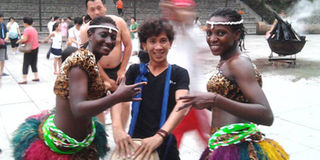A Ugandan woman who worked hard for clean money in China

Vicensia Namaganda, a Ugandan who earned a living from performing traditional dances in China, shares a moment with a fan and a colleague.
What you need to know:
A good number of Ugandan women in China are said to either be involved in prostitution or drugs, but Vicensia Namaganda’s story proves that there are Ugandans making an honest living in China. Hers is a story of passion for traditional dance that earned her a living in a foreign land.
Recently, Kampala was awash with several holiday makers, aka, the “Basummers” (Nkuba kyeyos) who were all over our dusty city painting it red making merry. But very few of them freely say what they actually do in the countries they live in. However, Vicensia Namaganda, 25, is not shy to say what she has been doing as her kyeyo for the last two years in China- performing traditional ganda dances.
Namaganda says as a small girl, she liked dancing to Congolese music and would effortlessly wriggle to soukous music whenever an opportunity presented it self.
When she joined primary school, she was immediately recruited into the school choir and taught the traditional Ganda dances. “I won many prizes at school dancing competitions which included plastic plates, cups, books, pens, geometrical sets and scholarships. little did I know I would one day fly to do traditional dancing abroad,” she says.
It was at one such event that Namaganda got her break. She says, after a performance at one particular wedding, a man walked up to her. She thought he wanted to tip or seduce her as is usually the case after performances. However, she gave him attention, though reluctantly.
“He said he was impressed with my performance and wanted to link me up with a Chinese promoter. I gave him my guardian’s number and asked him to call him and finalise everything. My guardian and the Chinese promoter under his company Pamoja Africa signed a two-year renewable contract, and as they say, the rest is history.”
She left for China after a month with three others, and headed straight to Jinan city, the capital of Shandong province in eastern China, they embarked on a two-year contract. “Life in Jinan was not bad at all, except that at times we would get homesick, she says.
Namaganda’s day at work
Her day began at 6am when she woke up and said a prayer, took a shower and prepared breakfast which composed of porridge made from yellow posho and snacks. At 7am, a shuttle would pick and drop her at the Joding mall, her work station.
“At 8am like all formal employees, we would start work- dancing for the shoppers. We would have a 30 minute break at 10.30am and resume dancing till midday when we would have our two-hour lunch break. From 2pm, we would continue with the performances till 5pm when our day would come to an end unless there would be special booking(s) for special performances after 5pm.”
Namaganda says, at the mall, people would pay 120 Yuans (about Shs49,000) as entry fee and go anywhere or watch any performance going on. They always performed at the Nationality square, which was within the mall where all performances are held. We would do Magunju, Bakisimba, Nankasa and at times lingala or creative dances.
“The Chinese are very kind people although many of them though know nothing about Africa. Some of them also thought our skin colour was part of the costume and would try to rub it off. The men would make fun of our behinds saying they were too big, while the Chinese girls were always running after the black boys wanting to discover what they were really made of.”
For dancing for the peolpe in China, Namaganda’s promoter was paid her 4,000 Yuan’s (about Shs1.6m), provided accommodation, food, medical expenses and handled the issue of her work permit.
Having been told that some of China’s delicacies include dog meat, snakes and, Namaganda decided to stick to what she knew- rice, chicken, vegetables and bread.
“The highlight of my stay was teaching the Chinese people how to dance our traditional dances. It was really funny seeing them trying to wriggle their waists; learning Chinese is another landmark, l can now speak good Chinese.”
She says her biggest challenge in China was the weather. “China has four different seasons, winter was the worst; we had to perform in our revealing costumes yet the cold was biting hard and that’s when the Chinese go out most so we had no option but to perform. We also never had a day off and we would dance from Monday to Monday - January to January.”
After two years, Namaganda decided to come back home and start a business from her savings. She has now started a family with a man she introduced to her parents.




